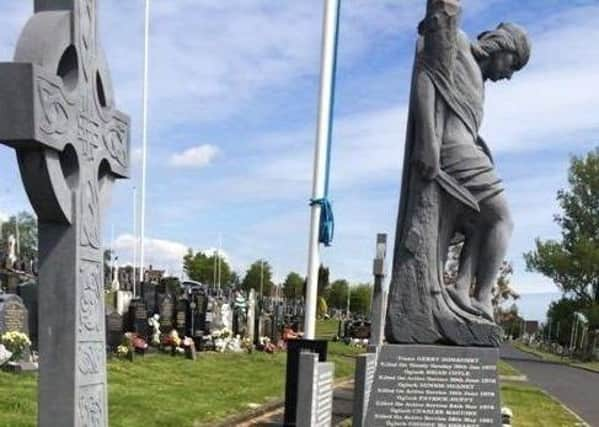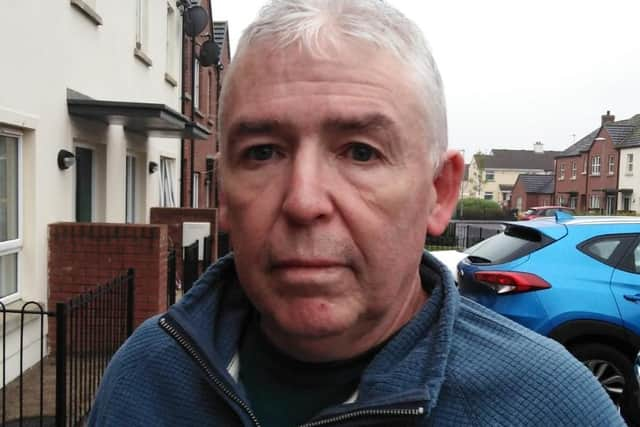Republican ex-prisoners in Derry to mount campaign over Victims Pension exclusion


Mickey Kinsella, co-ordinator with Tar Abhaile ex-prisoners group said that the recently published criteria for applying to the scheme had attempted to redefine the definition of a victim already agreed over a decade ago, and narrowed the parameters of eligibility.
Mr Kinsella said that as well as protests at landmarks across Derry over the coming weeks, the group is also planning to seek legal advice on challenging the guidelines announced by the British government.
Advertisement
Hide AdAdvertisement
Hide Ad“It’s clawbacks, the rewriting of history, it’s criminalisation as per the government of 1976, who decided to abolish political status almost as soon as it had been granted, and it really has been going on ever since,” he claimed, adding:


“Even now when ex-prisoners are out of prison, many of them ageing, suffering health problems - many of them had to shield during the pandemic - many of whom have genuine ailments because of their imprisonment, their beatings in H-Block, living naked for five years, they can’t even be considered for compensation.
“There’s still an element of the British in denial - denial of its role as a protagonist. They would like to have the world believe that they were a peace keeping force between two warring Irish tribes, and attempt to retain their own narrative.”
The Troubles victim compensation scheme, which was due to be opened to applications at the end of May, had been delayed due to a dispute between Sinn Féin and the Government over eligibility criteria that excluded anyone convicted of inflicting harm during the Troubles from accessing the support payments.
Advertisement
Hide AdAdvertisement
Hide AdA judge at Belfast High Court ruled last month that the NI Executive Office was acting unlawfully in delaying the introduction of the scheme, after a joint legal challenge was brought by two victims. The Judge said the Executive Office was under a “clear, unqualified and unconditional obligation” to designate a Stormont department to take it forward.
Sinn Féin had contended that the scheme would be discriminatory and would potentially exclude thousands in the republican community.
The Department of Justice in the north has now been designated to administer the scheme.
In its guidance, issued through the office of Secretary of State Brandon Lewis, the NIO said: “It is not appropriate for payments to be made to people who have a serious conviction for an offence that caused serious harm to others. Nor is it appropriate for payments to be made to people who have a recent conviction for a terrorist related offence, whether the offence is serious or not.
Advertisement
Hide AdAdvertisement
Hide Ad“In the unlikely event that the Board decides to award payments in such cases, despite this guidance being engaged, the Government will reserve the ability to exercise a power of intervention.”
‘REWRITING HISTORY’
Mr Kinsella likened the scheme’s definitions of a victim to a rewriting of history and said it flew in the face of binding agreements which explicitly stated that working to include and integrate ex-prisoners was a key element of the future in Northern Ireland.
He said: “The recent decision has forced the Executive to nominate a Department that will administer the Victims Pensions Scheme and as the co-ordinator of Tar Abhaile, Derry’s Republican ex-prisoners centre, working under the umbrella of Coiste na nIarchimi nationally, we are going to challenge the decision.”
“The decision”, he claimed, “supports the British government’s desire to create a hierarchy of victims and it undermines all the treaties, all the agreements that have been made since the Good Friday Agreement in 1998 right through to the Stormont House Agreement in 2014.
Advertisement
Hide AdAdvertisement
Hide Ad“It has effectively binned the definition of a victim laid out by the victims and Survivors Order of 2006, which can be considered by all as inclusive to all victims of the Conflict and that is the definition we agree with. But this decision by the British government and Court decision has binned that. We feel the decision was wrong,” Mr Kinsella said.
Mr Kinsella said many in the Republican ex-prisoner community and beyond felt that the scheme, as is stands, was part of the “British government’s attempt to dominate the narrative of the Conflict and to defend State forces who were involved in torture, forced confessions and were involved in collusion with loyalist/ unionist armed groups to carry out attacks on nationalists and republicans and were involved in many human rights violations”.
He added: “We in Tar Abhaile want to call on politicians, community groups, even sporting groups, anybody with an interest, to join in our attempts to establish a mechanism that will include a proper and inclusive Victims Pension Scheme and challenge the British attempts at creating a hierarchy of victims and the politically motivated exclusion of former political prisoners from this scheme.
“We want to challenge any attempt to further criminalise and further penalise political ex-prisoners. For many years after the Good Friday Agreement, ex-political prisoners have been socially excluded in matters of employment, adoption, insurance and travel and from other funding. So we are prepared to use legal advice and legal action to challenge this exclusionary and discriminatory Victims Pensions Scheme.”
PROTESTS PLANNED
Advertisement
Hide AdAdvertisement
Hide AdSinn Féin are supporting the ex-prisoners’ campaign, Mr Kinsella said, and as a member of the party he will be seeking its help in organising protests at landmarks.
Protests locations under consideration include Republican plot in the City Cemetery, Free Derry Wall, and also places that illustrate links with British establishment such as the Guildhall and the City Walls, although Mr Kinsella said all protests will be limited in numbers and socially distanced to keep everyone safe.
“The regulations discriminate against nationalists and Republicans that have been imprisoned during the conflict, many that were tortured, ill treated and abused during their interrogation,” he said. “The torturers and abusers will have unrestricted access to the Victims Pension Scheme. The scheme extends to Britain and Europe to ensure Crown Forces casualties in those geographical areas will be compensated or pensioned. Conflict casualties in the Irish Free State are bypassed.”
Mr Kinsella said there were groups of ex-Republican prisoners already organising themselves in other areas, and added that this also affects Loyalist ex-prisoners as some of them have been injured during the Troubles and spent time in prison.
Advertisement
Hide AdAdvertisement
Hide Ad“We as an ex-prisoners group, we don’t oppose it to anybody, Crown Forces, Loyalists, prisoners, prison service etc but we think it should be all inclusive for everybody and ex-prisoners should not be excluded.
“Here at Tar Abhaile we are involved in quite a bit of cross-community work. Over the years we have worked with people who represent the Loyalist ex-prisoners groups and sometimes ex-Crown forces, Veterans for Peace, so we have had it from the horse’s mouth, there is no monopoly on suffering, so there shouldn’t be a monopoly on who does or doesn’t get a pension.”
INTERNMENT
In addition to those who served prison terms, he said, those who were interned for over two and half years are also being excluded, as well as those who the British government has intelligence on.
He added that the board panel being presided over by members of the judiciary was “doing nothing for reconciliation” given many former prisoners’ experience of the court / justice system during the Conflict.
Advertisement
Hide AdAdvertisement
Hide Ad“There’s at least 25,000 Republicans and nationalists affected, including the interned, during the Conflict. In contrast, four British soldiers have been convicted and found guilty of murder. The biggest sentence served by any of them was six years.”
REGULATIONS
The Northern Ireland Office said that the The Victims’ Payment Regulations 2020 provide for a scheme “that acknowledges the harm caused to the small number of people who, through no fault of their own, are living with a permanent disablement caused by serious injury in Troubles-related incidents”.
The NIO guidance states that those injured at their own hand are excluded, and provide for the establishment of an independent Board, supported by the Executive, which will make case-by-case decisions.
“The guidance says that anyone who has a conviction - terrorist or otherwise - which caused serious harm to anyone else, should ordinarily not receive a payment.
Advertisement
Hide AdAdvertisement
Hide AdIt states: “It is not for the Government to prejudge the Board’s decisions which must rightly be taken on a case by case basis. But the guidance is intended to be helpful in setting out guiding principles to inform all relevant decisions.”
The Board can only decide that victims’ payments are inappropriate if the person has a relevant conviction or if there are exceptional circumstances.
The guidance states that the Board could decide that payments are inappropriate due to a range of factors, including the harm caused to someone else by the offence for which the applicant has a relevant conviction for, the specific nature of the offence and length of sentence, the age at the time of offence, or the passage of time since that offence and the individual’s behaviour since.